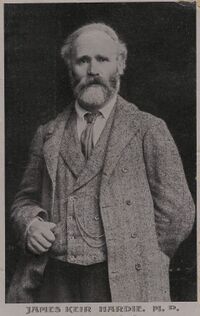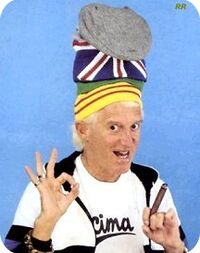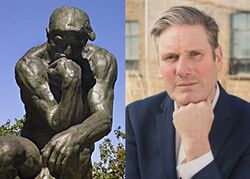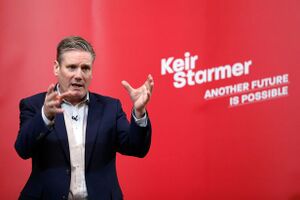Keir Starmer
Sir Keir Rodney Starmer KCB P-QB4 (born 2 September 1962) is a former legal eagle and current leader of the British Labour Party and now British Prime Minister since 5th July 2024.
Starmer He was elected in April 2020, succeeding Jeremy Corbyn, the Labour leader who had led the party to their worst defeat since 1935. He is a former Knight of the Round Table and lawyer, who took a Vow of Ridicule to lead the socialist opposition to Prime Minister Boris Johnson. In Parliament, he is the member for St. Pancreas.
Starmer stood as leader to prevent a woman from leading the working-class party, which he said would not be appropriately traditional. He has been a keen anti-Brexiteer, but now has dismissed this issue as 'stale,' the fresher issue being to prove that Johnson is a buffoon. This would seem not to require heavy lifting. Unfortunately, the polls suggest the British people rather prefer buffoonery.
Growing up[edit]
Starmer was named after a former Labour Party leader, Keir 'Kiss Me' Hardie, a whiskered Victorian politician in a mouldy suit. Keir Hardie is one of the few past Labour leaders the ultra-Marxist faction has not condemned for selling out socialism. His namesake Starmer, on the other hand, is regarded with deep suspicion by supporters of Jeremy Corbyn. Like many stalwart centrists in the Labour party, Starmer had a Trotskyite phase, aligning with the 'Pabloists,' a sect named after Sancho Pablo, a Mexican associate of Leon Trotsky and Frida Kahlo that believed in 'entryism.' This is a method of political infiltration/infection of a large body, not unlike catching coronavirus. The 'Pabloists' were easy to identify in their Mariachi bands and huge, sequined sombreros. In deep-blue Conservative areas like Surrey, they stood out a mile.
By the time Starmer got involved, the Pabloists had renounced Trotsky. They were, in effect, house-label socialists. They spent most of their time arguing amongst themselves and refusing to take phone calls. Starmer abandoned politics for a legal career.
Legal career[edit]
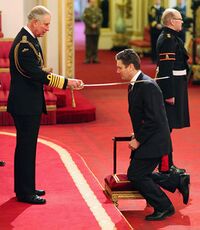
Starmer moved effortlessly into the world of wigs, fusty court rooms, and incredible wealth. His family had no background in the law — not even breaking it — as his father had been a machinist and his mother a nurse. He was still a socialist and of a distinctly different social class to his contemporaries. Starmer naturally gravitated to traditional leftist issues about human rights, animal rights, dirty water, and fighting big business. The latter was a vehicle to improve Starmer's profile. He took on mighty McDonald's in an obscure case of libel.
A few environmental activists had tried to bring down the fast-food chain over how they made their hamburgers, where they got them, and what they put in them. They distributed a pamphlet around London, read by patrons who were just about to sink their molars into a Big Mac. McDonald's sued the activists for millions of pounds, computed on the basis of a quarter-pound for each Quarter Pounder. McDonald's had gotten judgements against anyone in Britain who took offence to their food-like product.
Starmer became the unofficial unpaid legal advisor to the activists. The 30-year struggle was concluded in 2005. McDonald's prevailed, but did not receive their millions of pounds but a sum that paled before the costs of bringing the case in the first place, plus plenty of bad publicity. By then, Starmer had moved on. The legal establishment wanted him on their side — as a public prosecutor.
Director of Public Prosecutions[edit]
Starmer was named Head of the Crown Prosecution Service in 2008. It fell to Starmer to publish artsy rationales for not prosecuting police officers who shoot citizens. In 2012, however, he did prosecute Chris Huhne, who became the first Cabinet Minister to resign as a result of it being better off than winding up in gaol. Starmer said that "we do not shy away from prosecuting politicians." Only policemen.
In the summer of 2012, Starmer was involved in what became known as the "Twitter Joke Trial" involving an allegedly menacing message, or else a joke, on the popular social media site. Or else he wasn't.
One person who did escape Starmer's attention was Jimmy Savile (pictured). The former disc jockey, television presenter, and all-around deviant was also a serial sex predator, though every time Savile had been accused of paedophilia, he had successfully sued the accuser. Savile died in 2011 and was given a state funeral by the BBC.
When Savile's past came out, blame for the failure to act was liberally sprinkled on everyone — including Queen Elizabeth II and former Prime Minister Margaret Thatcher — except Starmer, who had retired from the office, to move in an overtly political direction.
Political career[edit]
In 2014, Starmer became Labour's candidate for St. Pancreas, a safe seat for Labour. In 2015, when Ed Miliband resigned, a number of activists[1] told Starmer it would be just as trivial to stand for party leader. Starmer declined, citing his inexperience and the desirability of Andy Burnham, only a majority did not desire Burnham, and everyone wound up with Jeremy Corbyn.
Corbyn appointed Starmer his shadow minister of immigration, only to see Starmer resign the next year, as he continued to view Corbyn as a dick.
Not so much of a dick, however, that Starmer would not accept a second pretend ministership in 2016, this time as the shadow Brexit secretary. In this role, he questioned Government's "destination" for the UK outside the European Union, stating that if it got too much further away, it would probably scrape up against Ireland or even Iceland. Prime Minister Theresa May did publish her plans, in what some considered a victory for Starmer, although she remained in Government and he remained out. Starmer has argued that the UK risks an "unsustainable legal vacuum" if it simply walks away from the EU and also fails to pass laws for itself.
Starmer has called for a "fundamental rethink" of immigration into Britain, calling for numbers to be reduced. This is not what you want from your shadow minister, at least if your surname is Corbyn. In May 2017, Starmer said that "free movement has to go" but "free movement of labour" has to stay. The process of elimination leaves free movement of vegetables and free movement of bowels as two things he might have meant.
Starmer supported a second referendum on Brexit (and a third, if Brits got the answer wrong again) and this became Labour's position in 2019, along with a position still on the outside of power.
Leadership of the Labour Party[edit]
In the 2019 British General Election, Labour got much further from power, and Corbyn was finally persuaded to get further from Labour. Starmer stood for Labour leader, winning a key endorsement from sleep medication Unisom and becoming Leader of the Opposition and Picker Up of the Pieces. His shadow cabinet included former leader Miliband, both the candidates he defeated for the leadership, and shadowy Anneliese Dodds for the Exchequer, and that is apparently a big deal, as she is a woman who might be trusted with the purse strings.
Onwards, sideways and upside down[edit]
Starmer's career as leader of the Labour party has seen him successfully expel Jeremy Corbyn from the parliamentary Labour party. The former party leader had declined to endorse a definition of anti-semitism adopted by Keir Starmer. All the other Labour MPs eventually signed on but Corbyn refused. He still remains in the Labour party but if tries to defend his seat against another official Labour candidate then he will be cast out. The Labour left were stunned but didn't rebel.
With his internal party critics largely silenced, Starmer's chief problem was voter recognition Who was he again? Prime Minister Boris Johnson said Starmer was 'boring' and cold. Starmer in turn treated Johnson like a criminal he needed to prosecute. In the end he didn't have to. Johnson blew his own career up. The next prime minister Liz Truss barely lasted a month. Her successor Rishi Sunak lasted from October 2022 to July 2024 when Starmer beat him in the 2024 British General election. It was a Labour landslide, scoring over 400 seats compared to the weak 120 or so won by the Conservatives. The smart (smary?) lawyer had beaten the rick kid Sunak.
Now indeed what...

